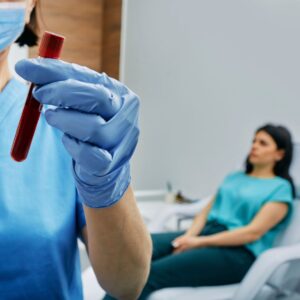Blog
High Prolactin (Hyperprolactinemia) in Women and Men: Causes, Symptoms, and Treatment
Prolactin, commonly known as the milk hormone, is essential for preparing the mammary glands to produce milk during pregnancy and maintaining breastfeeding after delivery. While it plays a critical role in reproduction, abnormally high prolactin levels in women who are not pregnant—or even in men—may lead to several health issues affecting fertility, menstrual regularity, and bone health.
Maintaining balanced prolactin levels is vital for overall hormonal health. Understanding the causes of high prolactin, the main symptoms, potential complications, and available treatment options is key for early management and prevention.
Normal and High Prolactin Levels

Prolactin values vary depending on sex and physiological state:
- Non-pregnant women: Less than 25 ng/mL.
- Men: Less than 20 ng/mL.
- Pregnant or breastfeeding women: Between 80 and 400 ng/mL.
Levels above 25 ng/mL are considered hyperprolactinemia. When prolactin exceeds 100 ng/mL, symptoms such as irregular periods and infertility, and in men, gynecomastia (breast enlargement) and reduced fertility, become more pronounced.
Causes of High Prolactin
Several factors can trigger elevated prolactin levels:
- Stress: Chronic physical or emotional stress increases prolactin secretion.
- Polycystic ovary syndrome (PCOS).
- Hypothyroidism (underactive thyroid).
- Low blood sugar (hypoglycemia).
- Pituitary tumors (prolactinomas).
- Medications: Blood pressure drugs, antidepressants, antipsychotics, opioid pain relievers, and certain acid reflux medications.
- Lifestyle triggers: Intense exercise or wearing tight clothing that stimulates the chest area.
Symptoms of High Prolactin in Women

The symptoms of hyperprolactinemia can vary but commonly include:
- Irregular or absent menstrual cycles.
- Infertility or difficulty conceiving.
- Vaginal dryness and reduced libido.
- Unexpected breast milk discharge (galactorrhea) without pregnancy or breastfeeding.
- Low bone density and higher risk of osteoporosis over time.
- In unmarried women: recurrent headaches, breast discharge, or mild weight gain.
Does High Prolactin Cause Vaginal Discharge?
High prolactin levels are more likely to cause vaginal dryness due to disrupted estrogen balance rather than abnormal vaginal discharge. Vaginal discharge is usually linked to infections or gynecological conditions, not prolactin itself—so distinguishing between the two is important.
Complications of Untreated Hyperprolactinemia
If left untreated, elevated prolactin may lead to:
- Ovulation problems and infertility.
- Decreased bone mass and higher risk of osteoporosis.
- Weight gain in some cases.
- Chronic fatigue and mood swings.
- In men: breast enlargement and reduced sperm quality.
Prolactin Treatment Duration
The time required to normalize prolactin depends on the underlying cause:
- Hypothyroidism: Levels improve once thyroid hormone therapy is started.
- Prolactinomas (pituitary tumors): May require several months of dopamine-agonist therapy (such as bromocriptine or cabergoline).
In general, prolactin should be rechecked monthly after starting treatment and then every 4–6 months to ensure stability.
Signs of Recovery from High Prolactin

Positive indicators that prolactin levels are returning to normal include:
- Regular menstrual cycles.
- Reduced or absent breast milk secretion.
- Improved fertility and higher chances of conception.
- Better energy, mood, and stable body weight.
Fastest Treatment for High Prolactin
Treatment depends on the root cause, but the fastest results usually come from combining medical and supportive lifestyle measures:
1. Medical Treatment
- Dopamine agonists (e.g., cabergoline, bromocriptine) effectively reduce prolactin levels by enhancing dopamine activity.
- Thyroid hormone replacement in cases of hypothyroidism.
- Surgical intervention in rare cases of large pituitary tumors.
2. Natural and Nutritional Support

- Stress management: Breathing exercises, yoga, walking, or swimming.
- Key supplements and nutrients:
- Vitamin B6, magnesium, zinc (balanced with copper), and vitamin D.
- Tyrosine-rich foods such as pumpkin seeds, legumes, eggs, and fish support dopamine production.
- Probiotics like yogurt and naturally fermented foods for gut health.
- Marjoram tea (Origanum majorana): traditionally used for 60 days to balance hormones.
- Foods to avoid: Herbs and foods known to stimulate prolactin, such as fenugreek, fennel, oats, almonds, and green anise.
How to Test Prolactin Levels Accurately
For reliable results, specific conditions must be followed before the blood test:
- Fasting for 6–8 hours.
- Avoid physical or emotional stress the day before.
- Take the test between 8 and 11 a.m., at least 3 hours after waking.
- No sexual activity or nipple stimulation for at least 3 days before testing.
- Discontinuing certain medications (only under medical advice).
Conclusion
High prolactin is a common but manageable condition. Early diagnosis and treatment prevent complications like infertility and bone loss. Knowing the normal prolactin levels and monitoring them is crucial, especially if symptoms such as irregular periods or difficulty conceiving appear.
Treatment may be medical, lifestyle-based, or a combination of both. With proper monitoring and care, most patients experience a full recovery and restoration of hormonal balance.
If you want a full guide/protocol that will help you balance all your hormones, follow the link below and choose the protocol that suits you to subscribe and begin your healing journey:
If you need to know more details about how to heal PCOS naturally, you can watch Dr. Fajer AlJumairi’s full episode on her YouTube channel:

